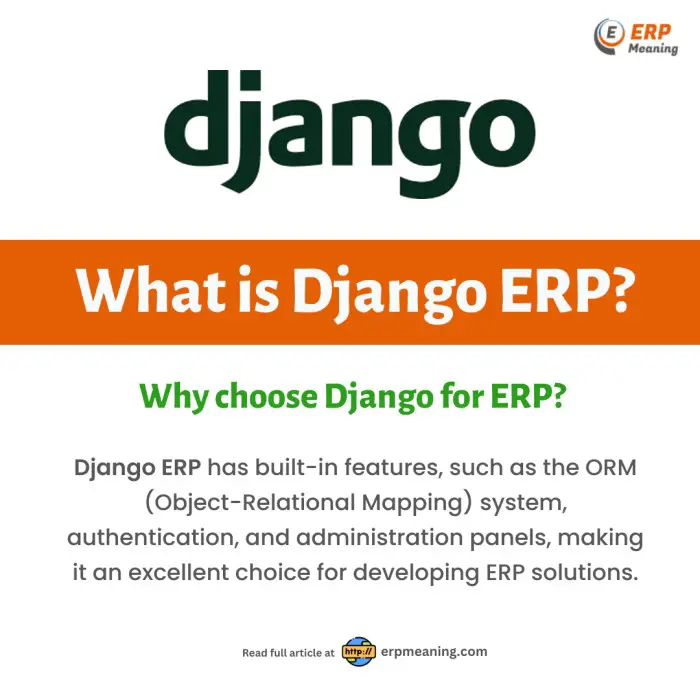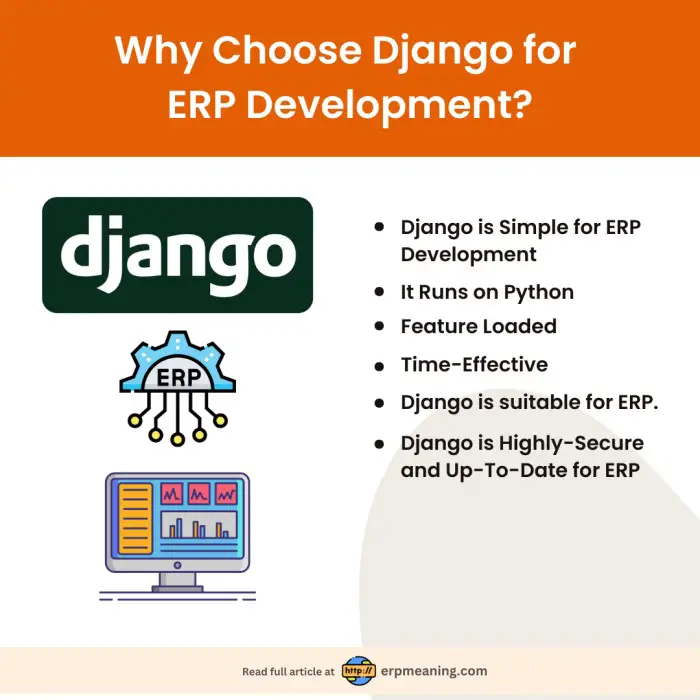
Enterprise Resource Planning (ERP) systems have become essential for businesses to effectively manage their operations and resources. However, choosing the right platform for developing an ERP system can be daunting. One popular option is to use Django. Django ERP has built-in features, such as the ORM (Object-Relational Mapping) system, authentication, and administration panels, making it an excellent choice for developing ERP solutions. This article will explore the benefits of choosing Django for your ERP (enterprise resource planning) needs.
What is Django for ERP?
Easy to use, secure, and maintainable is the best way to describe the Django ERP development framework. It was created by experienced developers to alleviate web development challenges, allowing you to concentrate on your app without starting from scratch. It is a free and open-source tool with a thriving user community, comprehensive documentation, and various free and paid support options. Django ERP is a web application framework designed specifically for enterprise resource planning. It provides the tools and components to build sophisticated ERP solutions, including the ORM system, authentication, authorization, and administration panels.
Django helps you develop complete, secure, versatile, and cost-effective ERP software. It’s built with tools like the ORM (Object-Relational Mapping) system, authentication, and administration panels to help you develop secure and stable software solutions.

Why Choose Django for ERP Development?
For enterprise resource planning system development, Django is a good option for a few reasons, including the following:
Django is Simple for ERP Development
The Django framework has excellent documentation that has maintained its high quality. It is easy to use and simplifies the development process by handling the basics, allowing you to concentrate on your ERP project’s distinctive and complex aspects.
It Runs on Python
The Django framework uses Python, a dynamic and high-level programming language. Django software development is suitable for most use cases, as Python is a popular language that has consistently been one of the top choices since 2018. It competes with other languages like C++ and Java.
Python’s versatility comes from its ability to run on various platforms, including PC, Linux and PlayStation. It also supports object-oriented programming and is designed to be easy to read, like a pseudo-code language. Additionally, Python has a more interactive interface than other programming languages, allowing users to focus on the task at hand rather than memorizing syntax.
Developing web applications with Django in Python is a quick and efficient process with concise code. Python offers a wide range of libraries, making it accessible and convenient to learn and put into practice. Due to its streamlined code, businesses favor Django for web development, resulting in lower costs and faster project completion.
Feature Loaded
The Django web development framework has all the necessary tools to create a complete application without additional customization. This is because it follows Python’s “batteries included” approach. Therefore, developing a simple application or prototype does not require spending hours customizing the framework.
If you need more features to create a complex application, Django has over 4,000 packages available, including debugging, profiling, and testing.
The Django framework provides access to a variety of tool packages that enable support for cutting-edge technologies such as AI, ML and data analytics. These user-friendly tools can be easily incorporated into projects, particularly in math-oriented fields like FinTech.
Time-Effective
The Django web development framework offers various features that enhance efficiency, save time, and minimize costs. It is particularly suitable for creating MVPs and prototypes. One of its advantages over Laravel is its versatile and well-organized admin panel. Additionally, Django enables developers to utilize existing code from previous projects, including reusable applications, tools, and features.
Django has excellent templates and forms that other projects have emulated. The various pre-built libraries and tools in Django enable developers to quickly create a good prototype.
Django is suitable for ERP.
Although Django is not typically considered an enterprise solution like Java or C#, it is a versatile framework that can be used for projects of any size. Its features and scalability make it especially well-suited for ERP solutions. Additionally, the Django framework offers various modules that meet enterprise needs, such as authentication, logging, and management panels. It also includes additional tools like web services (REST API), messaging (Websocket) systems, and SQL Database, which are necessary for efficient ERP development.
Django is Highly-Secure and Up-To-Date for ERP
Security is a critical concern for website development, and Django has consistently been at the forefront of maintaining the highest standards. Regular security patches are released, even for older framework versions, keeping websites secure against emerging threats. Django has an LTS (Long-term Support) version, which provides extended support and security updates for up to three years. With these measures, businesses can trust that their websites built on Django are secure and protected against potential vulnerabilities.
How popular is Django for ERP?
Although there is no clear-cut way to measure the popularity of server-side frameworks, you can make an approximate estimation by counting the number of projects on GitHub and the number of questions on StackOverflow for each platform. Instead of asking whether Django is popular, a more relevant question would be whether it is popular enough to overcome the issues of less popular platforms. Is it still advancing and improving? Are there ample resources available if you need assistance? Will learning Django create job opportunities for you?
Yes, Django is a popular framework due to the many popular sites that use it, many contributors to the codebase, and the availability of free and paid support. For example, the Django Documentation is updated regularly, and developers can find plenty of resources to learn and stay up-to-date with the framework. Therefore, it is a suitable platform for creating enterprise solutions like ERP systems.
Related article: Angular framework for ERP development? (2023)
Benefits of Django ERP
Python-like database management
Starting a Django project allows you to create your application’s data model in Python without learning SQL. Through an ORM, Django can transform a standard database structure into Python classes, enabling you to work entirely in Python. Additionally, Django-MySQL can work with JSON data and its associated functionalities.
Django converts database tables into Python classes. To access and manage data in web applications, Django models are used. The fields in the database are directly converted into attributes of the class. If you know how to define class attributes in Python, then managing a Django database is easy.
The Django Web Framework makes integrating your database into your web application easier. It offers features such as HttpResponse, cross-site scripting, user management, and software administration. Once you’ve imported the necessary packages and connected them to your database, you can create your application’s specific features.
Create dynamic HTML
Django is designed for web app development and requires creating dynamic HTML that shows personalized data for each user. To achieve this, Django has a DTL templating engine that can generate dynamic HTML.
With Django, developers can easily create new web pages by combining static elements such as colors, logos, and text with data such as user information. By using an HTML template, they can create a model-view-controller (MVC) structure with static text (such as “Welcome to the site, X”) and a dynamic placeholder that automatically displays the user’s first name from the database. The result is a page that seamlessly displays both static and dynamic content.
Enhance security
The security of an ERP system is paramount for businesses, which is why Django takes special measures to ensure its applications are secure. All Django releases are tested and released according to the highest security standards in the industry. Additionally, regular security patches are released, even for older framework versions, keeping websites secure against emerging threats. Furthermore, Django has built-in security features such as anti-CSRF protection, safe password hashing, and SSL/TLS support. All of these measures serve to protect Django ERP applications from malicious attacks and potential data breaches.
Django ERP Example
While Django ERP is a popular choice for building enterprise resource planning systems, it is also used by several prominent companies for their web applications. A few businesses that have successfully used Django in their web development are listed below:
Instagram: Instagram is a social media site for sharing pictures and videos, and its backend is powered by Django ERP. Django’s robust features, such as its ORM (Object-Relational Mapping) system and efficient database management, allow Instagram to handle the large volumes of data its users generate.
National Geographic: National Geographic is a well-known brand that uses Django ERP to power its website. Django’s built-in security features and scalability allow the company to manage its vast content library efficiently.
Mozilla: Mozilla, the company behind the popular web browser Firefox, uses Django ERP for several web applications. Django’s speed and versatility make it an ideal choice for developing Mozilla’s web tools.
Spotify: The popular music streaming service, uses Django for its web backend. Django’s ability to handle high-traffic loads and its extensive library of third-party packages make it a reliable choice for powering Spotify’s web services.
Pinterest: The social media platform for visual inspiration, uses Django for its web backend. Django’s built-in features, such as the admin panel and ORM system, make it easier for Pinterest to manage and organize its vast images and user-generated content database.
Bitbucket: The web-based code hosting service, uses Django ERP for its backend. Django’s security features and scalability allow Bitbucket to manage its vast code repository while keeping it secure from potential threats.
Related article: React for ERP Development
Features of Django ERP
When it comes to building an ERP system with Django, several features make Django ERP a suitable choice:
- Scalability: Django’s modular design and ability to handle high-traffic loads make it scalable, essential for ERP systems that must grow with the business.
- Security: Django has built-in security features, such as password hashing, cross-site scripting protection, and CSRF (Cross-Site Request Forgery) protection, which are crucial for keeping sensitive business data safe.
- ORM (Object-Relational Mapping): Django’s ORM system allows for easy database management and query building, essential for ERP systems that rely on database management.
- Administration panel: Django’s built-in administration panel allows for easy management of ERP data, such as user accounts, permissions, and workflows.
- Third-party packages: Django’s vast library of third-party packages allows for quick and easy implementation of features such as user authentication, form validation, and CAPTCHA protection, saving development time and effort.
- Community support: Django has a supportive and active community continually improving and enhancing the framework. This community support ensures that Django is reliable and secure for building ERP systems.
Conclusion
Django is a popular framework for building enterprise resource planning systems. Its scalability, security features, and library of third-party packages make it an ideal choice for creating robust ERP systems that can grow with the business. Furthermore, its built-in administration panel allows easy data management, while its ORM system simplifies database management. Finally, its strong community support ensures that Django can provide reliable and secure ERP solutions for businesses of all sizes. All in all, Django is a powerful and versatile framework for building enterprise resource planning systems.
